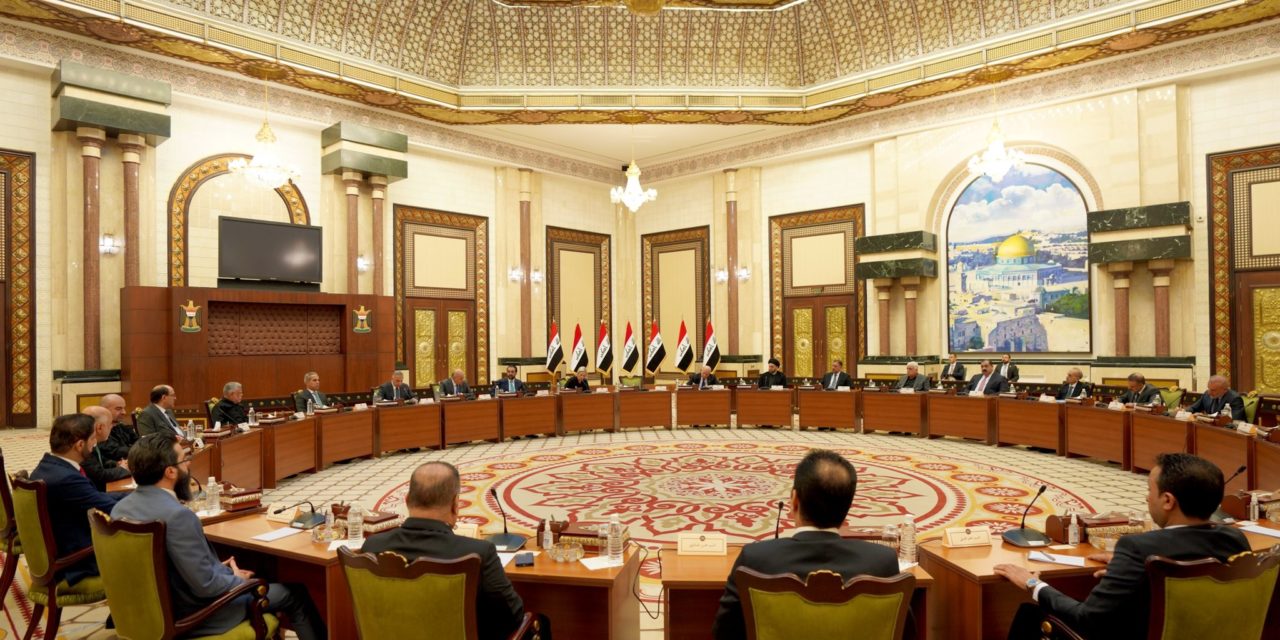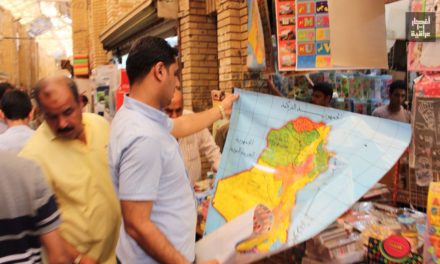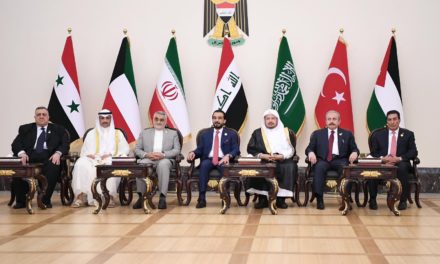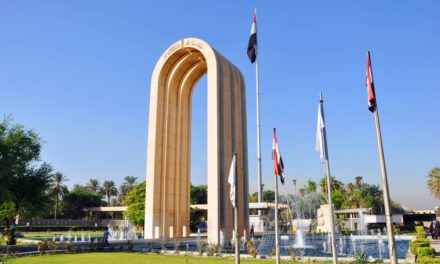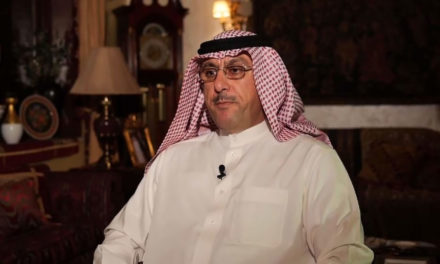(Photo: PMO Media Office)
On July 30, supporters of Muqtada Al-Sadr stormed the parliament building for the second time in a week, kicking off a sit-in, protesting Mohammed Shi’a Al-Sudani’s candidacy for the premiership. The breach came a month after the leader of the Sadrist Movement, Muqtada Al-Sadr, ordered his parliamentarians to resign due to the political deadlockthat has left Iraq with an outgoing caretaker government for over 10 months since early elections were held in October 2021. Although Sadr asserts that he and his followers will not participate in a government consisting of corrupt legislators, this is merely a pretext. The withdrawal, in actuality, is due to a combination of factors related to his party’s inability to expand its control, and it has brought about numerous alarming developments.
Following October’s elections, Sadr’s bloc earned 73 seats in parliament. This meant that the party not only had a plurality in parliament, but it also gained more seats than it did in the 2018 parliamentary elections, despite the decrease in voter turnout and the formation of reform parties that sought to contend with it and other leading parties. Although this increase seemed to gratify the Sadrists, it was not nearly enough to comprise a majority in parliament—a requirement for appointing the speaker, the president, and ultimately the prime minister. As a consequence, Sadr looked to the Kurdistan Democratic Party (KDP) and an entente containing the two largest, yet typically rival, Sunni Arab parties, to form the Tripartite Alliance.
While Sadrists cite their supposed opposition to corruption as their reason for pulling out of parliament, this is nothing short of a fallacy. Even disregarding the party’s own corruption, the formation of the Tripartite Alliance evinces that the Sadrists are willing to collaborate with fraudulent legislators. The KDP has an infamous history of corruption, including the use of the Kurdistan Regional Government’s assets for personal gain, the repression of protesters and journalists, and the backing of land grabs against ethnic minorities, such as Assyrians. Furthermore, members of the two Sunni Arab parties of the Tripartite Alliance, Taqaddum and Al-Azm, have each been accused of engaging in unlawful activity.
Evidently, corruption is not a concern for Sadr and his supporters. In forming the Tripartite Alliance, he and his party sought to expand their political control. Together, the alliance held at least 167 seats—enough to form a simple majority, or what is called a broad consensus. However, Sadr sought to form a majority government. This would position him and his party to exercise an unprecedented amount of leverage over the state’s affairs, as a majority government has never been accomplished in post-invasion Iraq. According to the Iraqi Federal Supreme Court’s interpretation of Article 70 in the constitution, a government as such would require a two-thirds majority—a number the Tripartite Alliance fell more than 50 seats short of.
To make up for this shortcoming, the Sadrists attempted to appeal to independents and smaller Shi’a parties to gain their support in parliament. These parties resisted the Sadrists’ entreaties, insisting on either remaining independent or supporting the Coordination Framework, a collection of dissenting Shi’a parties spearheaded by Nouri Al-Maliki, a former prime minister and consistent rival of Sadr. While many Western analysts consider these parties’ positions a consequence of their affiliations with Tehran, this is an overly simplistic view and even a falsehood in several cases. The reality is that Iraq is undergoing a change in its political dynamics. Unlike in 2005, when Shi’a parties with varying leanings cooperated under the United Iraqi Alliance, today’s Shi’a parties find themselves in a power struggle. Since the 2018 parliamentary elections, the Sadrists have emerged as the strongest contender. And as they try to become the sole representative of Iraq’s Shi’a population, other established Shi’a parties are working in tandem to prevent this from transpiring. This is why political adversaries have found themselves backing the Coordination Framework.
Due to the Sadrists’ inability to form a majority government, Sadr resorted to demanding that his members of parliament resign. According to parliamentary procedures, seats left vacant by representatives are to be filled by their runners-up, who in this case are mainly members of parties in the Coordination Framework or independents. Although this decision in theory should have weakened the Sadrists, it paradoxically strengthened their position. Sadr was intentional in removing his members from parliament because it allowed him to deflect blame on other parties, especially those in the Coordination Framework, while still effectively having a hand in state affairs. This was possible due to the Sadrists’ emphasis on gaining and maintaining ministerial positions. Sadr’s populist rhetoric also gave him the ability to incite his largely working-class base to protest at his command.
In response to the Coordination Framework’s nomination of Mohammed Shi’a Al-Sudani, who the Sadrists regard as a puppet of Maliki, Sadr showcased this ability to provoke protests. On July 27, masses of his supporters breached the heavily-fortified Green Zone to take over parliament. The demonstrations intensified on July 30, only a day before the start of the Islamic holy month of Muharram. Sadr praised the demonstration as a revolution akin to that of Imam Hussain’s, a historic figure who Shi’a Muslims believe embodies the struggle against injustice.
Only two days after the start of parliament’s occupation, supporters of the Coordination Framework organized counterdemonstrations. Although several of the coalition’s leaders called for a de-escalation, preferring to negotiate with Sadr, the threat of a violent confrontation remains imminent. The possibility of an armed conflict between rival parties has existed for several years now. Since the integration of politically-backed forces into the Iraqi state’s security apparatus, rival parties have strengthened their positions militarily. And the fear is that these forces, which—despite their heroism against Da’esh—have proven to be problematic, could be used to settle political scores within the country. A conflict as such would inevitably impact Iraqi civilians the most, for they would be caught in the crossfire and pressured to take sides.
Furthermore, the Iraqi state has shown its reluctance to confront the supporters of both camps, raising questions about its capabilities. There is a stark contrast between the government’s response to current demonstrations and prior ones, such as those of October 2019. Unlike the latter movement, which generally consisted of anti-establishment youth, the protesters today are clear supporters of various leading parties. Any use of violence against them could lead to further conflict, including one between the state and these parties. Not only does the government’s response further expose its shameless double standards towards its citizens, but it also illuminates its weakness. Since 2003, Iraqi governments have relied heavily on established parties for support. This is especially true in the case of the Kadhimi government, which attained its position through party compromises and support from Sadr.
This unbalanced dynamic makes it impractical for the government to restrain the country’s most powerful parties and, by extension, these parties’ armed wings and supporters. As the political crisis worsens, concerns about the state’s capabilities are increasing. In the grim case that an armed confrontation breaks out between the Sadrists and his opposition, will the state be able to maintain control over Iraq’s security apparatus? More importantly, will the security apparatus be able to control the situation? Hopefully, these questions remain unanswered, but their possibilities must be considered in this uncertain time.
It is difficult to make predictions about Iraq’s near future and even more difficult to devise solutions for its innumerable issues (e.g. dire living conditions, economic instability, foreign military aggression, climate crises, mass corruption, etc.), but one thing is certain: another armed conflict is the last thing Iraq needs. Realizing this, Sadr must cede and accept the consequences of his decisions. The political deadlock cannot continue for much longer; addressing real concerns, such as the lack of services in Iraq’s sweltering heat, should be prioritized over fulfilling the desires of a cleric who voluntarily removed his party from the government-formation process. Lastly, those encouraging Sadr and considering supporting his movement must not forget his contributions to violence and dysfunction in Iraq. His rhetoric and leanings are not reliable measures of his intentions and contributions, which are certainly driven by a pursuit of dominance, not reform.


